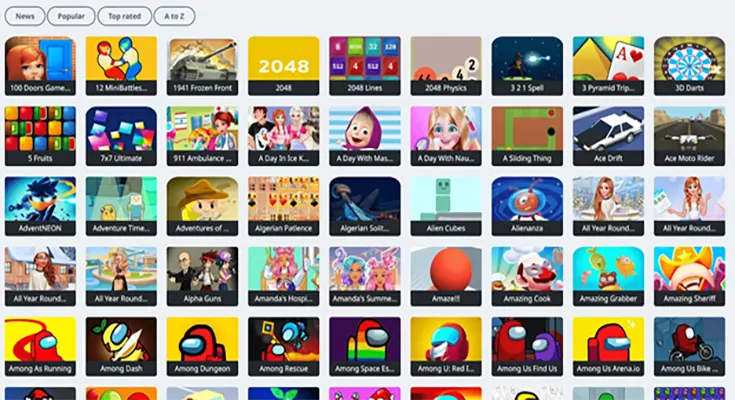In today’s fast-paced digital world, online games are more than just fun distractions for kids. They have become vital tools in the classroom and beyond. Educational gaming has stepped into the spotlight, transforming how children learn by marrying entertainment with education. These interactive experiences ignite curiosity and make complex concepts easier to grasp. When kids play these games, they’re not just having a good time; they’re also developing crucial skills that will serve them well throughout their lives.
Gone are the days when learning meant sitting through long lectures or flipping through dusty textbooks. Online games for kids offer an engaging alternative to traditional education, capturing young learners’ attention in ways that old-school methods simply cannot. With vibrant graphics and appealing storylines, these games invite children to explore math problems, history lessons, and science experiments—all while playing! Curious about which games can enhance your child’s learning journey? Let’s dive into the exciting world of smart playtime and discover eight captivating online games that are reshaping educational experiences as we know them!
The Role of Online Games in Modern Education
Online games for kids have emerged as engaging tools that go beyond simple entertainment, fostering critical thinking and problem-solving skills essential in today’s world. When children navigate through challenges and puzzles, they are not just playing; they are learning to assess situations, make decisions, and think strategically. For instance, games like “Minecraft” encourage players to construct complex structures while considering resource management and environmental factors. Such interactive learning experiences help children practice logic, reasoning, and creativity—all crucial components of effective problem-solving.
In addition to individual skill development, many online games provide multiplayer platforms where collaboration becomes a key component of the gameplay. Students can work together to achieve common goals, whether they’re teaming up in a virtual heist or facing off against each other in friendly competitions. This collaborative environment not only enhances their social skills but also teaches them the value of teamwork. Skills such as communication, negotiation, and conflict resolution come into play here—attributes that will serve them well throughout their lives. Games like “Roblox” exemplify this by allowing players to share their creations whilst collaborating with others on various coding projects.
Moreover, one of the most significant advantages of online educational gaming is its ability to cater to different learning styles. Some children may thrive with visual inputs found in graphic-heavy puzzle games, while others might excel in auditory-rich environments or hands-on activities found within simulation games. Platforms like “Kahoot!” enable educators to create customizable quizzes that can be visually stimulating or even involve music elements tailored to student preferences. This versatility makes it easier for parents and teachers alike to find suitable online games for kids that resonate with diverse learners and adapt lessons in an engaging manner.
By tapping into the inherent curiosity of children through game-based learning, we can transform traditional education methods into something captivating and relevant—a dynamic approach where knowledge acquisition feels less like a chore and more like an adventure! As technology evolves, so too does our understanding of how interactive experiences can enhance learning capabilities across varied age groups—proving that when fun meets education, everyone wins!
Game #1: Basketball Legends Unblocked 76
Among the myriad of online games available today, Basketball Legends Unblocked 76 stands out as an engaging strategy game that seamlessly incorporates educational elements into its fast-paced gameplay. Set in vibrant arenas where players control their favorite basketball stars, this game not only entertains but also empowers kids to sharpen their critical thinking skills. As they navigate through matches, players must devise effective strategies to outsmart opponents, fostering an environment of imaginative gameplay and strategic planning.
One of the standout educational benefits of *Basketball Legends Unblocked 76* is its emphasis on cognitive skills such as planning and foresight. Players are put to the test as they consider various tactics—should they take a shot from afar or pass it to a teammate? These split-second decisions require players to analyze the situation before them, weighing risks and rewards while predicting opponent moves. This dynamic fosters skills that extend beyond the virtual court and into real-world problem-solving experiences.
Adding another layer to its charm, the game’s engaging features contribute significantly to maintaining motivation among young learners. With power-ups and unique character abilities, children are not just observers but participants who can shape their experience based on choices made during playtime. Incorporating multiplayer modes allows for teamwork and collaboration with friends, further enhancing social interaction while promoting interpersonal relationships—a vital component in developing emotional intelligence alongside academic competence.
Ultimately, *Basketball Legends Unblocked 76* represents how playful learning can make educational development exciting for kids aged 6-12. By combining sports with strategic thinking, children remain engaged as they hone not only their playing techniques but also essential life skills that serve them well in academics and beyond—all without them even realizing they’re learning!
Game #2: Creative Puzzles
Creative Puzzles is an exciting online game that encourages kids to think outside the box while reinforcing essential academic skills. Through a variety of engaging challenges, players must solve intricate puzzles by applying logic, creativity, and lateral thinking. This interactive platform not only stimulates children’s cognitive abilities but also instills a sense of accomplishment as they navigate through increasingly complex scenarios. It’s perfect for kids who thrive in imaginative environments, showcasing how online games for kids can transform a mundane task into an exhilarating adventure.
Each level introduces unique subjects and concepts, seamlessly integrating math and language arts into the gameplay. For instance, children might encounter geometric patterns requiring them to calculate angles or tackle vocabulary riddles that expand their language skills. Teachers have found that these creative puzzles provide a refreshing approach to learning; students are often more engaged with the material when it’s woven into captivating gameplay rather than mere textbook exercises. Additionally, the competition element encourages teamwork and collaboration as friends can team up to crack codes or complete challenges together.
Feedback from educators has been overwhelmingly positive. Ms. Jennifer, a fourth-grade teacher at Sunnydale Academy, shared her experience: “After introducing Creative Puzzles in my classroom, I’ve noticed significant improvement in my students’ problem-solving abilities! They anticipate their strengths while discussing solutions enthusiastically.” Furthermore, students echo this sentiment; ten-year-old Jake remarked, “I love playing this game after school! It feels like I’m playing instead of doing homework!” This enthusiasm highlights how video games designed for learning can foster both knowledge retention and critical thinking skills among young learners.
Overall, Creative Puzzles stands out as an impactful tool in the digital learning landscape. By transforming traditional educational content into delightful challenges that captivate children’s imaginations, this game exemplifies how playful engagement can lead to meaningful learning outcomes—proving once again that smart playtime truly holds transformative power for our future generation.
Game #3: Low’s Adventure 2
Step into the captivating world of Low’s Adventure 2, a coding strategy game that takes children on exhilarating quests while introducing them to the fundamentals of programming. Designed for ages 6-12, this game delights players with its colorful graphics and engaging storyline, all while subtly instilling essential coding skills through gameplay. As kids navigate through challenging levels, they must solve puzzles by writing basic code snippets, making strategic decisions that enhance both their problem-solving abilities and creative thinking.
One of the standout features of “Low’s Adventure 2” is its interactive approach. Instead of merely memorizing concepts, children learn to apply coding principles in practical situations—like directing Low through tricky mazes or battling quirky adversaries. Each successful completion not only boosts kids’ confidence but also equips them with knowledge that’s increasingly important in today’s technology-driven world. For instance, learning to use loops teaches them efficiency in problem-solving, a skill applicable beyond gaming and into real-life scenarios.
Parents and educators will appreciate how this game stands out among typical traditional educational tools. With its gamified learning experience, it captures children’s attention far better than a textbook ever could. This immersion fosters early engagement with STEM concepts that often spark lifelong interests in fields such as engineering or computer science. Plus, “Low’s Adventure 2” offers various levels of difficulty tailored for diverse learners—ensuring that whether your child is a budding coder or just beginning their technological journey, there’s always something aligned with their skills.
As students embark on their mission to help Low succeed, they also grasp valuable lessons about perseverance and critical thinking—a fantastic bonus that gaming can provide! With its unique blend of entertainment and education, “Low’s Adventure 2” exemplifies how strategy games can transform playtime into smart learning opportunities for our young adventurers.
Game #4: Coding Quest Adventure
In the dynamic world of online games for kids, “Coding Quest Adventure” stands out as a vital learning tool that introduces children to programming fundamentals in a fun and interactive way. This game immerses players in an engaging storyline where they embark on quests that require them to solve coding challenges to progress. By breaking down complex concepts into manageable puzzles, it captures the imagination while simultaneously laying a strong foundation for essential coding skills.
Starting early with coding knowledge can be extremely advantageous for future STEM careers. In today’s tech-driven society, understanding programming languages can set children up for success in various fields—whether they’re aspiring software developers or engineers. “Coding Quest Adventure” not only teaches kids how to think algorithmically but also nurtures problem-solving strategies as they encounter real-time obstacles within the game. As they decode their way through levels, players gain confidence in tackling challenges—a skill transferable to many life scenarios beyond the screen.
One of the amazing features of “Coding Quest Adventure” is its incorporation of real-world applications. As players advance through different stages, they are presented with scenarios that mimic actual situations programmers face, such as debugging code or optimizing algorithms. These scenarios are crafted in easy-to-understand language and relatable contexts that make complex concepts like loops and conditionals accessible even to younger audiences. The game’s vibrant graphics and engaging gameplay encourage digital playtime without losing focus on learning outcomes.
By fostering creativity alongside computational thinking, “Coding Quest Adventure” serves as a bridge connecting gaming with education. Parents and educators looking for quality online games for kids will find this platform a valuable resource not just for entertainment but also for encouraging critical skills relevant in the modern world. Embracing these new-age tools can enrich children’s educational experiences while inspiring them toward innovative paths in their futures!
Game #5: Language Learning Challenges
Language Learning Challenges is a captivating game designed to make mastering vocabulary and grammar both fun and interactive! Unlike traditional rote memorization methods, this game employs engaging storytelling techniques that immerse players in various thematic adventures where language skills take center stage. As children navigate through these rich narratives, they tackle language puzzles, complete sentences, and encounter exciting obstacles that enhance their linguistic abilities. By doing so, they not only learn how to construct grammatically correct phrases but also expand their vocabulary in an organic way.
One standout feature of Language Learning Challenges is its emphasis on interactive elements that prompt active participation. Whether it’s engaging in collaborative activities with peers or competing against friends, each gameplay session encourages kids to practice their language skills creatively. For instance, when players complete a challenge together, they must communicate effectively using the target language—a wonderful opportunity for real-life application! This fosters teamwork while reinforcing essential communication skills that are crucial in our interconnected world.
Moreover, the game brilliantly integrates cultural insights as part of its narrative arcs. Players might find themselves decoding idiomatic expressions while immersed in different cultural settings or learning about traditions associated with specific holidays around the globe. These elements not only boost comprehension but also inspire curiosity about diverse cultures and backgrounds. By equipping kids with knowledge beyond just vocabulary, Language Learning Challenges creates well-rounded learners who appreciate the nuances of language within its broader societal context.
With its unique blend of playful engagement and educational rigor, Language Learning Challenges transforms what could be a daunting task into an enjoyable adventure! Children will leave each session feeling accomplished—not just because they’ve leveled up in the game but because they’ve genuinely enhanced their cognitive toolkit for understanding languages worldwide.
Game #6: Cookie Clicker 2
Cookie Clicker 2 is not just a delightful simulation game but also an engaging platform that introduces kids to various scientific concepts through play. At its core, the game allows players to create and manage their own cookie empire while integrating fundamental ideas of production, economics, and even basic mathematics. As children click and progress through levels, they’re not only having fun; they are unknowingly participating in experiential learning that reinforces school curriculum topics such as resource management and exponential growth.
One of the standout features of Cookie Clicker 2 Unblocked is the hands-on experience it provides with virtual experiments. Players can explore different strategies for maximizing cookie production—deciding whether to invest in traditional baking versus high-tech upgrades like “cookie farms.” This decision-making process encourages critical thinking and enhances comprehension as kids grasp cause-and-effect relationships within the game’s mechanics. For instance, experimenting with varying strategies teaches valuable lessons about supply and demand in a way reminiscent of real-world economic principles.
The integration of Cookie Clicker 2 into educational settings has proven seamless due to its ability to complement existing curricula. Teachers can utilize this skill-building game as a teaching tool in subjects like math by encouraging students to track their cookie counts over time or make predictions based on patterns they observe during gameplay. Additionally, some educators report using the game as a springboard for discussions about topics like energy consumption and environmental impact related to food production—opening up avenues for cross-disciplinary connections that engage students on multiple levels.
As parents seek out online games for kids that combine enjoyment with education, Cookie Clicker 2 stands out as an exemplary choice. By enabling children to merge creativity with critical thinking while encountering foundational concepts in science and economics, this playful learning environment fosters both cognitive development and curiosity—a fantastic recipe for success in today’s digital age!
Game #7: History Time Travel Expeditions
History Time Travel Expeditions is a captivating adventure game that propels players back to significant moments in time, allowing them to interact with historical figures and events in an immersive way. This alchemy of entertainment and learning serves as an engaging portal for children to explore everything from ancient civilizations to pivotal moments in modern history. The game’s interactive missions encourage players to solve mysteries or complete challenges tied directly to the curriculum, making the learning experience not only fun but also incredibly relevant.
What sets this game apart is its alignment with specific educational standards—teachers can easily incorporate it into their instructional strategies. For example, during a lesson on the American Revolution, players might be tasked with gathering resources or rallying support for the Continental Army while building their knowledge of key battles and figures. This method solidifies comprehension through active engagement, empowering kids to better retain information about historical narratives compared to passive study methods such as reading textbooks alone.
The game doesn’t just present information; it also enhances the learning journey by embedding delightful fun facts and unique challenges that spark curiosity. Imagine discovering what inspired famous speeches or participating in problem-solving scenarios amidst ancient ruins! Incorporating such excitement into gameplay maximizes student engagement and encourages deeper exploration beyond the screen, fostering critical discussions about history during family time. Moreover, parents are encouraged to manage their children’s screen time effectively without stifling curiosity—striking a balance that allows kids to enjoy games like these while developing healthy gaming habits.
Whether your child wants to unravel secrets of Ancient Egypt or uncover clues during the Renaissance, History Time Travel Expeditions makes history dazzlingly tangible. By jumping into this vibrant world of past adventures, children aren’t just seeing history; they are living it!
Tips for Parents and Educators
When selecting online games for kids, it’s essential to prioritize quality over quantity. Look for games that are specifically designed with educational goals in mind, integrating core subjects like math, science, and language arts seamlessly into the gameplay. For example, a game like “Math Blaster” not only encourages fun but also focuses on critical skills such as problem-solving and logical thinking. Checking reviews from educators or various parenting platforms can guide you toward the best options that transform playtime into valuable learning experiences.
Setting up healthy gaming habits is crucial to ensure that kids enjoy online games as part of a balanced lifestyle. Establish clear boundaries around screen time by designating specific times during the day for gameplay—be it after school or on weekends—to help structure their schedules. Engaging in joint play sessions can further enhance this balance; playing together allows parents to monitor content while fostering connection and interaction. Encourage breaks between gaming sessions to prevent fatigue and promote physical activity outside the digital realm.
Moreover, creating an environment that promotes discussions about what kids are learning during playtime can significantly boost retention and understanding. After each gaming session, take time to chat about their experiences—ask questions like “What strategies did you use?” or “Which new words did you learn today?” This conversation enhances critical thinking while allowing children to articulate their thoughts clearly. Connecting lessons from online games to real-world scenarios will reinforce knowledge gained from learning outside the classroom, helping children see practical applications in everyday life.
Overall, when used thoughtfully, online games can become powerful tools within families and classrooms alike. By choosing high-quality educational content, establishing healthy routines, and fostering engaging discussions around gameplay, parents and educators can maximize the enriching potential of these interactive resources—turning fun into foundational skills every step of the way!
Embrace the Future of Learning
In today’s digital world, online games for kids have become powerful tools that transform education. These games make learning fun while fostering essential skills like critical thinking and teamwork. No longer seen as just an entertainment option, they complement traditional teaching methods brilliantly.
Let’s embrace these innovative tools for holistic development. Parents and educators should explore new gaming methods together, discovering the endless possibilities they offer. By engaging with these interactive platforms, you can help children learn in exciting and meaningful ways. So gear up, dive into smart playtime, and watch your child thrive!










